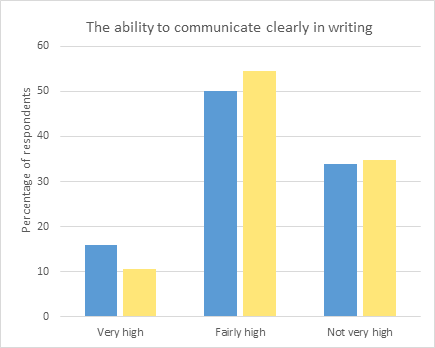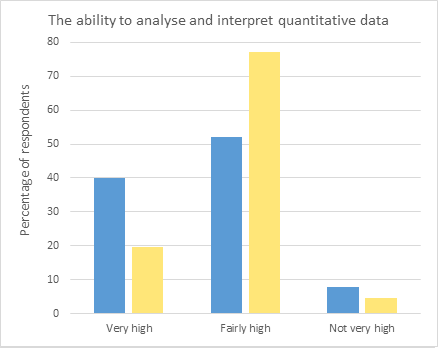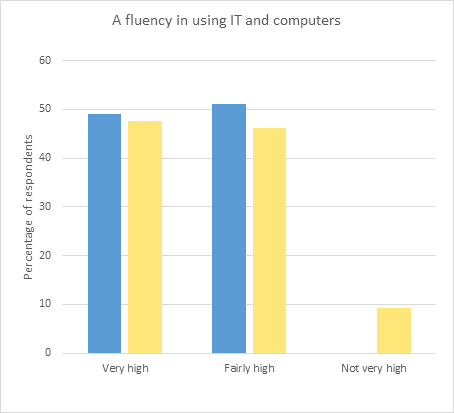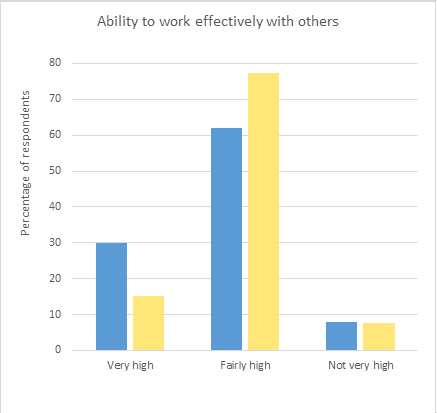Alice Beckett
The Economics Network
Published March 2015
Introduction
This is the Economics Network's fourth survey of employers of economics graduates. The survey aims to improve understanding of the skills and knowledge economics graduates require to be effective in the workplace. This report offers a detailed summary of the basic findings of this year’s survey with some comparison with our previous 2012 Employers’ Survey. A more in-depth report of our most recent survey will follow. This research was conducted with the support of the Government Economic Service and the Society of Business Economists.
The Network’s other research includes a collaborative project (in 2013-2014) to explore changes in student behaviour and expectations following the recent increase in tuition fees and surveys of employers of economics graduates, alumni, lecturers and students. See our website for further information.
Skills Valued by Employers
- Employers considered the ability to analyse economic, business and social issues, and the ability to organise, interpret and present quantitative data to be most important amongst economics graduates.
- Employers considered understanding and interpreting financial matters and framing, defined as the ability to formulate economic problems, determine the important parameters and construct constrained solutions, to be least important amongst economics graduates.
- Abstraction was defined as the ability to simplify complexity while still retaining relevance.
 Figure 1 – Skills Employers See as Important To Economics Graduates - Click to enlarge
Figure 1 – Skills Employers See as Important To Economics Graduates - Click to enlarge
How Employers Rate the Skills of Economics Graduates
- Employers most frequently considered the level of skill of economics graduates to be very high in using IT and computers. They most frequently considered the level of skill of economics graduates to be not very high for critical self-awareness.
- Other skills for which employers frequently cited the level of skill as not very high included the ability to apply what has been learned in a wider context and general creative and imaginative powers.
- Skills for which employers frequently considered the level of skill to be very high included the ability to analyse and interpret quantitative data and the ability to work effectively with others.
 Figure 2 – How Employers Rate the Skills of Current Economics Graduates - Click to enlarge
Figure 2 – How Employers Rate the Skills of Current Economics Graduates - Click to enlarge
Areas of Knowledge and Understanding Valued by Employers
- Employers valued knowledge and understanding of incentives and their effects most highly, with the highest number of respondents rating knowledge in this area as very important.
- Employers valued knowledge and understanding of equilibrium and disequilibrium the least, with the lowest number of respondents rating knowledge in this area as very important.
- Employers also considered important knowledge and understanding of social costs and benefits and opportunity cost. They did not consider as important the impact of expectations and surprises and macroeconomic variables and the impact of macroeconomic changes.
 Figure 3 - Areas of Knowledge and Understanding Valued by Employers - Click to enlarge
Figure 3 - Areas of Knowledge and Understanding Valued by Employers - Click to enlarge
Skills and Knowledge Most Needing Further Development
Employers were asked to name which skills and knowledge they believed most needed to be developed further in economics degree courses. Their comments were grouped into categories. Employers most frequently mentioned a need for development in the application of economic theory. Other skills frequently mentioned included communication skills, quantitative skills, economic history and cost-benefit analysis.
| Skill | Number of references in comments |
|---|---|
| Application of economic theory | 16 |
| Communication skills | 11 |
| Quantitative skills | 6 |
| Critical thinking | 5 |
| Economic history and the history of economic thought | 5 |
| Cost-benefit analysis | 5 |
| Data skills | 5 |
| Political awareness | 5 |
Figure 4 - Skills and Knowledge Most Needing Further Development According to Employers
 Figure 5 - Wordle of Employers Comments Regarding Skills and Knowledge in Need of Further Development - Click to enlarge
Figure 5 - Wordle of Employers Comments Regarding Skills and Knowledge in Need of Further Development - Click to enlarge
Comparisons with Previous Surveys
Comparing our 2014-15 survey results with our previous results in 2012 shows some interesting similarities and differences.
- The proportion of employers reporting that the level of economics graduates ability to analyse and interpret quantitative data is “very high” has fallen considerably since our previous survey, with a greater proportion of employers now considering graduates level of skill in this area to be “fairly high”.
- A higher proportion of employers responded that graduates ability in using IT and computers was “not very high” compared with the previous survey. Despite this, using IT and computers was still the skill category where the skill level of graduates was considered “very high” by the largest proportion of employers.





Figures 6, 7, 8 and 9 - Employers Responses Regarding Economics Graduates' Skill Levels Compared with Our Previous Survey
This report is cited in:
- Rob Ackrill and Dean Garratt (July 2015) "Letter: Elitism and the state of economics education" RES Newsletter
- Andrew Mearman (July 2015) "Letter: The purpose of economics" RES Newsletter
- Diane Coyle and Simon Wren-Lewis (July 2015) "Letter: Diane Coyle and Simon Wren Lewis respond" RES Newsletter

